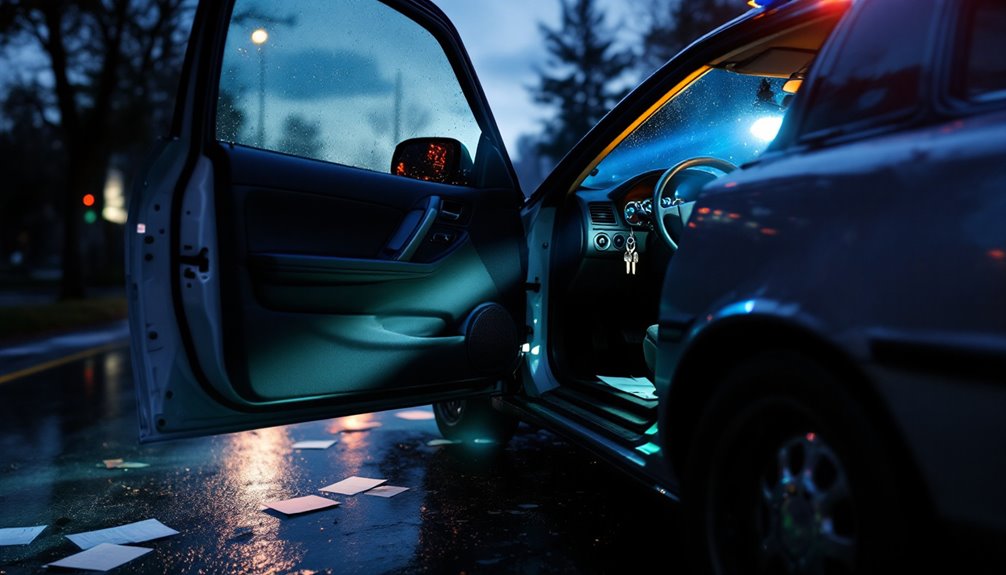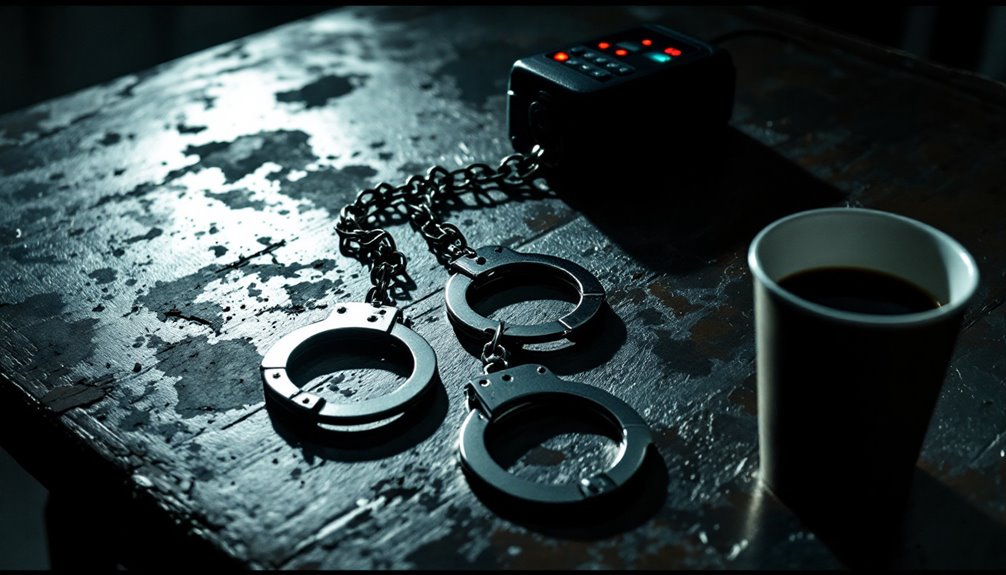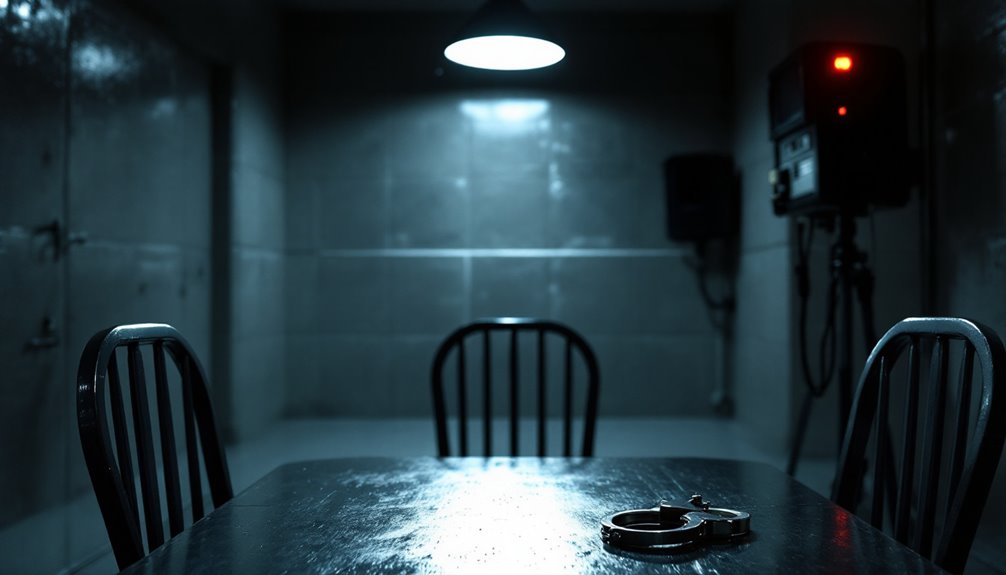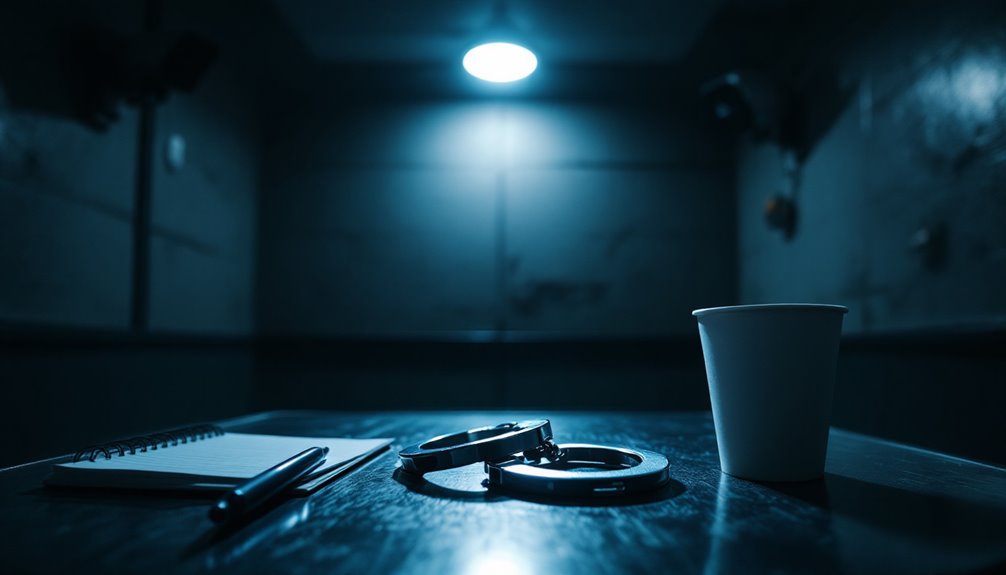When speaking to the police, some phrases can worsen a situation, even if you're innocent. Avoid saying, "I didn't know that was illegal," as ignorance isn't a defense. "I was just trying to help" might increase suspicion. Admitting guilt or seeking deals on the spot without legal counsel is risky. Saying "I have nothing to hide" can lead to unintended disclosures. Assuming confidentiality with "this stays between us, right?" is a mistake. Discover why these words might harm you.
Key Takeaways
- "I didn't know that was illegal" won't excuse you from criminal liability and can complicate your legal situation.
- Saying "I was just trying to help" may increase police suspicion and lead to more questions or complications.
- Admitting "I'm guilty, but can we work something out?" can strengthen the prosecution's case and affect sentencing.
- "I have nothing to hide" can lead to unintended admissions; privacy is fundamental, and statements can be misinterpreted.
- Assuming "this stays between us, right?" is risky; police conversations aren't guaranteed confidential and can be used as evidence.
I Didnt Know That Was Illegal

Why does ignorance of the law often fail as a defense? The Supreme Court ruling in _Heien v. North Carolina_ shows that police can make reasonable mistakes about the law without violating constitutional rights. Yet, this leniency doesn't extend to ordinary citizens. People can't claim ignorance when facing criminal charges. They must know their rights, like their Miranda rights, to build a solid criminal defense.
Justice Sotomayor’s dissent highlights concerns about public trust. It suggests a double standard between citizens and police. Civilians must be aware of legal boundaries. Even if unaware, saying “I didn’t know that was illegal” is not a defense. It underscores the importance of understanding the law to avoid legal complications and protect one’s rights. This principle is particularly pertinent for small business owners, who often face a myriad of regulations that can be daunting to navigate. Inadequate legal knowledge can lead to top legal mistakes small businesses make, such as failing to comply with zoning laws or misclassifying employees, which can have significant financial consequences. Ensuring that business owners are informed about their legal responsibilities is vital for fostering a fair and just marketplace.
I Was Just Trying to Help

Misunderstanding can lead to unexpected complications during police interactions. Saying "I was just trying to help" might seem harmless, but it can cause problems. It could be seen as an admission of involvement, even if unintended. This might increase police suspicion and lead to more questions. It could also be misinterpreted as a sign of guilt or knowledge of something undisclosed. Legally, such statements can affect admissibility in court. Anything said to police can be used as evidence, potentially harming one's defense. This statement might be seen as inconsistent with other accounts, impacting legal rights and the case's outcome. It is crucial to be cautious with words to avoid escalating or complicating the situation further.
Im Guilty, But Can We Work Something Out?

In the heat of a police encounter, admitting guilt and trying to negotiate can be tempting. However, such admissions of guilt can have serious consequences. They can be used as evidence in court, especially if Miranda Rights have been read, and can substantially strengthen the prosecution's case. Attempting to work out a deal without legal counsel can reduce leverage in pre-trial negotiations and plea bargains. It's important to remember:
- Admissions can be seen as confessions, impacting sentencing.
- Police may use deception to obtain admissions.
- Legal advice is vital before making any statements.
Negotiating with law enforcement without an attorney can compromise one's legal defense. It's best to remain silent and seek legal representation immediately.
I Have Nothing to Hide

Many individuals believe they have nothing to hide when interacting with the police. This mindset can seem harmless, but it carries risks. When someone says they have nothing to hide, it might lead to unintended admissions of guilt. Even innocent statements can be twisted or misinterpreted. The "nothing to hide" argument often underestimates the importance of privacy and the potential misuse of personal information. Experts suggest seeking legal advice before speaking to law enforcement. Privacy is a fundamental right, not just for those with secrets. Simply having nothing to hide does not mean one should waive their rights. Police questioning is complex, and legal advice can help protect individuals from misunderstandings or legal troubles.
This Stays Between Us, Right?

Why do people often believe that their conversations with the police will remain confidential? Many assume police act like therapists, bound to secrecy. However, in the criminal justice system, confidentiality is not guaranteed. Informants' identities can be revealed during legal disputes if it aids a fair trial. Saying "This stays between us, right?" is risky. Here's why:
- Court Orders: The court can override confidentiality for justice.
- Legal Guidelines: Confidentiality relies on strict rules, which can change.
- Risks of Disclosure: Revealing an informant can lead to legal challenges.
In the criminal justice system, what is said can impact trials. Police follow legal guidelines, but confidentiality is complex. Always consider the consequences before speaking.
Frequently Asked Questions
Can Admitting Ignorance of the Law Lessen My Charges?
Admitting ignorance of the law might help in certain cases. If a crime requires knowing the law and the person didn't know, it could reduce charges. This is more likely if the law is new or not well-known. However, ignorance is usually not a defense. It depends on the situation and the law. Consulting a lawyer can help understand if it applies in a specific case.
What if Helping the Police Makes Me More Suspicious?
Ironically, helping the police can sometimes make one appear more suspicious. When someone volunteers information, it can raise questions about why they're so enthusiastic to help. Law enforcement may wonder if there's something to hide. Being helpful can backfire, leading to more scrutiny. It's a strange twist where good intentions might complicate matters. Hence, knowing one's rights and being cautious with words can be more beneficial.
Does Confessing Reduce My Sentence or Lead to Leniency?
Confessing does not guarantee a reduced sentence or leniency. Sentencing decisions are usually made in court, not during police interactions. Leniency depends on the circumstances and evidence. Staying calm and respectful can help, but legal advice is vital. Confessions can be used as evidence, affecting the case negatively. It is important to understand rights and remain cautious about what is said to the police to avoid unintended consequences.
Is It Safe to Share Everything if I Believe I'm Innocent?
Sharing everything with the police is not always safe, even if someone believes they are innocent. Misunderstandings can happen. Words might be twisted, leading to unintended problems. The police aim to gather evidence, not determine innocence. It's important to remain silent until a lawyer is present. A lawyer helps protect rights and guarantees nothing said can be used against the person. Being cautious is wise in legal situations.
Will the Police Keep My Confession Confidential?
The police are not required to keep confessions confidential. Their role is to gather evidence for prosecution. Anything said to the police can be used in court. Confessions and statements, even if made innocently, can be taken out of context. It is essential to remain silent and ask for a lawyer. This protects one's rights and prevents self-incrimination. Legal counsel can guide individuals on what to say or not say.
Conclusion
The article highlights the risks of saying the wrong things to police, even when innocent. An interesting statistic reveals that about 25% of wrongful convictions involve false confessions. This underscores the need for careful communication. Readers learn the importance of knowing what not to say, from expressing ignorance of the law to attempting to negotiate. By understanding these pitfalls, individuals can better protect their rights during police interactions and avoid unintended legal consequences. One of the biggest legal mistakes after arrest is speaking without a lawyer present, as anything said can be used against the accused. Remaining silent and requesting legal counsel are crucial steps to avoiding misinterpretation or self-incrimination. By staying informed and cautious, individuals can navigate these situations more safely and protect their legal rights. Furthermore, individuals facing serious charges, such as house arrest for fifth DUI charges, must be especially vigilant in their interactions with law enforcement. It is essential to recognize that even seemingly harmless statements can significantly impact one’s case, potentially reinforcing a narrative that could lead to harsher penalties or further legal complications. Therefore, securing legal representation as soon as possible can provide essential guidance and ensure that rights are upheld throughout the legal process. Additionally, individuals facing charges such as DUI should be aware of their options regarding house arrest alternatives for DUI, which can provide a more lenient punitive measure compared to traditional incarceration. Exploring these alternatives not only highlights the importance of legal representation but also the benefits of staying informed about different legal pathways. Ultimately, proactive measures and a clear understanding of rights can significantly influence the outcome of an interaction with law enforcement. Furthermore, the importance of understanding the Miranda warning significance in law cannot be overstated. This warning serves as a crucial safeguard for individuals in police custody, ensuring they are aware of their rights to remain silent and to have legal representation. Being informed about these rights empowers individuals to make safer choices during interrogations, ultimately fostering a better understanding of their legal protections and preventing potential injustices.
